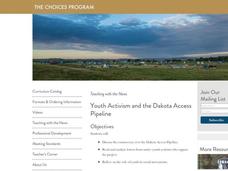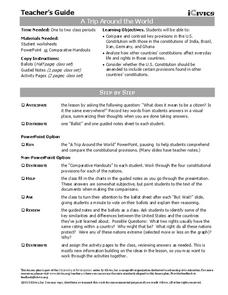Social Skills Central
Ready, Set, Respond!
When faced with a difficult situation, do you respond selfishly, face it head on, or ignore the problem? This game encourages learners to evaluate the wide range of reactions we can have to problematic situations, and how our responses...
Curated OER
Marriage and Financial Goals, Budgeting Strategies
There is no more useful life skill to learn than budgeting and setting financial goals. It's math that is used by every person, everyday. Learners examine the responsibilities and costs involved in family economics. Through a series of...
Curated OER
Family Forms and Family Life Cycle
There are so many different types of families, and each family functions in a different way. Discover the different roles, responsibilities, and relationships that develop in different family types. The lesson provides you with five...
National Geographic
Rivers and the Gabcikovo-Nagymaros Project
Damming rivers has been a case of necessity versus negative environmental impact since the process began. Kids take on the role of a stakeholder in the proposed damming of the Danube River. They begin by reading arguments for and against...
Jamestown-Yorktown Foundation
Why Did Some Colonial Virginians Seek Independence?
To understand the reasonings of those colonials who sought independence from England, young historians are divided into content groups that examine documents related to either the Boston Tea Party, the Yorktown Tea Party, Tea Overboard,...
National Endowment for the Humanities
Chief Executives Compared: The Federalist Papers
Delve into the responsibilities of the president by looking at President Hamilton's opinion of the presidential office in his own words. The second in a three-part series, the resource also offers an interesting compare-and-contrast...
iCivics
For The President, All In A Day's Work
How does the president of the United States get the authority to exercise his/her duties? What responsibilities and tasks go into a hard day's work for the president? Here is a lesson plan that includes several instructional materials...
National Endowment for the Humanities
Revolution '67, Lesson 1: Protest: Why and How
To some people, protesting is as American as apple pie, but the factors that lead to protests can be as confusing to veteran activists as to today's youth. Revolution '67 explores the riots in Newark, New Jersey as a case study. Using...
Center for Civic Education
Citizenship Schools and Civic Education During the Civil Rights Movement and in the Present
Your young historians will discover the importance that citizenship education has played in the social progress of the United States as they learn about early efforts to discourage African Americans from voting in the 1960s.
Brown University
Youth Activism and the Dakota Access Pipeline
Do young people have a role in social movements? Should they? The involvement of young people in the Dakota Access Pipeline is the focus of a resource that asks class members to examine letters written by native youths who oppose the...
Curated OER
Dulce et Decorum est by Wilfred Owen
It is entirely fitting and proper that Wilfred Owen’s powerful “Dulce et Decorum Est” is the poem used for an exercise in close reading, discussion, analysis, and argumentative writing. Class members discuss focus questions in pairs,...
Do2Learn
Respecting the Ideas of Others
Communicating clearly is one part of a successful conversation, but listening to others is just as important. Individuals with special needs plan calm responses and reactions to differing opinions with a collaborative activity.
Do2Learn
Waiting Your Turn to Speak
Have you ever been so excited to talk that you interrupted another person? Help young conversationalists wait their turn to speak with a social skills activity.
Curated OER
Culture, Race & Ethnicity
Is there a difference between culture, race, and ethnicity? In order to celebrate Harmony Day and cultural diversity, your class will brainstorm, discuss, and discover that there is. The class splits into three groups, each group is...
iCivics
Foreign Policy: War
What is the difference between foreign and domestic policy? What are the primary differences in what the United States hopes to accomplish through foreign aid, the military, and the creation of treaties? Your class members will examine...
iCivics
A Trip Around the World
How do the rights of citizens in other countries, such as India, Germany, Brazil, and Iran, compare to those of Americans? Take a closer look at the provisions of various foreign constitutions, and compare and contrast the protections...
Center for Civic Education
The Power of Nonviolence: Change Through Strategic Nonviolent Action
How did major historical figures, such as Henry David Thoreau, Susan B. Anthony, and Mohandas K. Gandhi, explain and defend their beliefs in nonviolence? Your learners will begin by studying the backgrounds of these individuals, and then...
Macmillan Education
Communication
Especially tricky for language is understanding the line between inappropriate, confrontational, (in)effective, (un)reasonable and diplomatic English. The activities in the resource permit class members to practice communicating using...
University of California
The Civil War: Lincoln’s Speeches
Abraham Lincoln is responsible for uniting the states during the most tumultuous periods in American history, and for his elegant oratory that kept the Union believing in its cause. Young histoians analyze various speeches by America's...
US Holocaust Museum
Nazi Olympics: Berlin 1936
The Olympics are about more than sports—at times, the games are also a place of racism and prejudice! Pupils investigate the 1936 Olympics in Berlin, Germany. They analyze the meaning behind the materials included in the United States...
PBS
Helen Keller: Author, Advocate, and Activist
Have you ever had to work through a disability or shortcoming? Scholars analyze the life and impact of author, advocate, and activist Helen Keller. After researching photos, video clips, and primary sources, individuals form a written...
Overcoming Obstacles
Playing by the Rules
The takeaway from the "Playing by the Rules" instructional activity is that it is each person's responsibility to learn the rules in a given situation and that they must accept the consequences if they choose not to follow the stated...
Missouri Department of Elementary
“Re-Solutioning”: Practice Brings Out Our Best
Seventh graders create and perform a skit that demonstrates their conflict resolution skills. They begin by examining the process of crafting a performance and review what they have learned about conflict resolution. Next, they...
Overcoming Obstacles
Making a Choice
The big idea in the last lesson plan in the Decision-Making module is that responsible decision-making is a process rather than a knee-jerk reaction. Participants practice the five steps in the decision-making process they have learned...
Other popular searches
- Fame and Social Responsibility
- Global Social Responsibility
- Business Social Responsibility
- Liva Social Responsibility

























